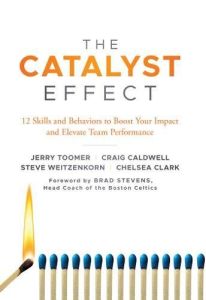Join getAbstract to access the summary!

Join getAbstract to access the summary!
Jerry Toomer, Craig Caldwell, Steve Weitzenkorn and Chelsea Clark
The Catalyst Effect
12 Skills and Behaviors to Boost Your Impact and Elevate Team Performance
Emerald Publishing Limited, 2018
What's inside?
To encourage superior performance, “catalytic leaders” develop their command of 12 important competencies.
Recommendation
As businesses confront new challenges, “catalytic leaders” use their command of 12 important skills to encourage superior performance. Jerry Toomer, Craig Caldwell, Steve Weitzenkorn and Chelsea Clark group these crucial abilities into four sets of competencies: “building credibility, creating cohesion, generating momentum” and “amplifying impact.” If you can’t touch your listeners’ emotions, the authors warn, your audience might not understand the message you intend to convey.
Summary
About the Authors
Jerry Toomer, PhD, is executive partner and adjunct professor at the Lacy School of Business at Butler University, where Craig Caldwell, PhD, is associate dean of Graduate & Professional Programs. Steve Weitzenkorn, PhD, is an organizational adviser and strategy consultant. Chelsea Clark, PhD, founded Chelsea Clark Consulting, LLC, a relationship research firm.

















Comment on this summary